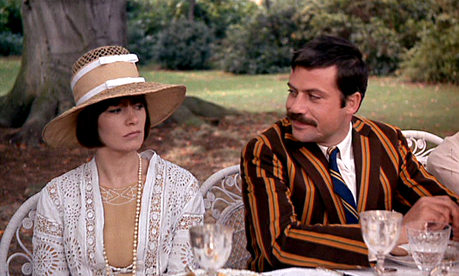 Ken Russell's Women in Love (1969) is an excellent adaptation of D.H. Lawrence's novel. Women's sexual content aroused controversy, though compared to Russell's later work (The Devils, anyone?) it's relatively tame. Russell mixes stylish direction with thoughtful characterization, helped by an ace cast.
Ken Russell's Women in Love (1969) is an excellent adaptation of D.H. Lawrence's novel. Women's sexual content aroused controversy, though compared to Russell's later work (The Devils, anyone?) it's relatively tame. Russell mixes stylish direction with thoughtful characterization, helped by an ace cast.Sisters Gudrun (Glenda Jackson) and Ursula Brangwen (Jennie Linden) are schoolteachers in 1920s England, yearning for romantic excitement. Gudrun attracts Gerald Crich (Oliver Reed), repressed heir of a mining magnate (Alan Webb); Ursula woos Rupert (Alan Bates), a footloose school inspector. Their relationships grow complicated: Gudrun and Gerald seem incompatible, while Rupert struggles to separate from spoiled lover Hermione (Eleanor Bron). Rupert entertains unorthodox ideas about love and friendship which baffle his companions.
Women in Love's a remarkable achievement. One must salute Russell's direction, providing a pointed rebuke to genre-mandated handsomeness. He interposes ragged, editing jerky zooms and close-ups, along with chaotic staging (a drunken brawl interrupting a stately establishing shot). Equally striking are odd compositions, like Ursula dancing amongst a cowherd or an Alpine scale shot where distant Ursula shrinks behind gigantic Rupert. Cinematographer Billy Williams makes Women beautiful, yet Russell doesn't linger on opulent sets and costumes.
Women's unconventionality extends to its sexual content. The love scenes aren't very erotic: Ursula and Rupert have a tryst in the woods, concluded by a shock cut to corpses. Both of Gerald and Gudrun's couplings are unpleasant, one bordering on rape. One affecting shot lingers on Gudrun lying awake, pinned beneath a slumbering Gerald. This counterpoint of sex and violence extends to the notorious wrestling match: Gerald and Rupert's intense brawling feels more sexually charged than lovemaking with their wives.
Larry Kramer's elegant script conveys Lawrence's philosophizing in digestible form: bourgeois, heterosexual love entraps people (like the ill-fated young couple befriended by Gudrun and Ursula) and extinguishes their true passion. Ursula becomes enchanted by Rupert's leering come-ons; worldly Gudrun mixes contempt for male sexuality with passionate self-expression. Gerald comes to embody bourgeois discontent: he can't comprehend Gudrun's artistic leanings or Rupert's pan-sexual philosophizing. Obsessed with his business, he can't grasp his father's old school noblesse oblige either.
Glenda Jackson gives a career-defining performance: fiery, headstrong, reckless and narcissistic. Jennie Linden fleshes out her one-note character into an equally strong character. Oliver Reed is surprisingly low-key, transforming his snarling intensity into thoughtful brooding. Alan Bates (Royal Flash) gets the weakest role: Rupert's too busy spouting aphorisms to become a fully formed character. Michael Gough (Batman) appears briefly, and there's a standout role for Vladek Sheybal (The Wind and the Lion) as an eccentric artist.
Women in Love inevitably misses some of Lawrence's texture and social commentary. Yet it captures the gist of his novel, its intelligence only enhanced by Russell's direction. Compared to the staid stateliness of its contemporaries (Far from the Madding Crowd), Women feels refreshingly energetic.

